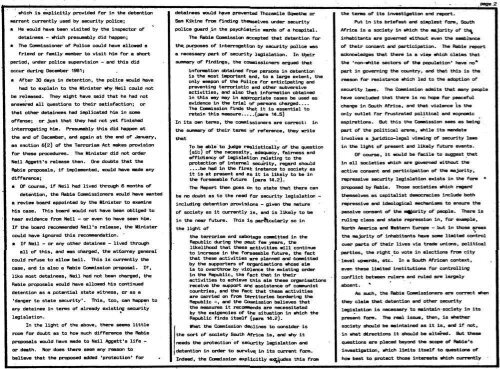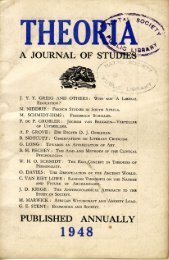Create successful ePaper yourself
Turn your PDF publications into a flip-book with our unique Google optimized e-Paper software.
which is p-plicltly provided for in the detention<br />
•arrant currently used by security police;<br />
B He would neve been visited by the Inspector of<br />
detainees - which presumably did happen;<br />
e The Commissioner of Police could have allowed e<br />
friend or family member to visit hie for a short<br />
period, under police supervision - and this did<br />
occur during December 1961;<br />
e After 30 deys in detention, the police mould have<br />
had to explein to the Minister why Nell could not<br />
be released. They eight neve said that he had not<br />
answered all questions to their satisfaction; or<br />
that other detainees had Implicated him in some<br />
offense; or Just that they had not yet finished<br />
interrogating him. Prasummbly this did happen et<br />
the end of Omcember. and again at the end of January,<br />
as ssctlon 6(2) of the Terrorism Act makes provision<br />
for these procedures. The Minister did not order<br />
Weil Aagett'3 release then. One doubte that the<br />
Rabie proposals, If Implemented, would have made any<br />
difference;<br />
a Of course, if Hell had lived through 6 months of<br />
detention, the Rebio Commissioners would have wanted<br />
e review board appointed by the Minister to exemine<br />
his came. This board would not have been obliged to<br />
hear evidence from Hell - or even to have seen him.<br />
If the board rsccwmmnded hell's release, the Minister<br />
could have ignored this recommendation,<br />
a If Hell - or any other detainee - lived through<br />
ell of this, and waa charged, the attorney generel<br />
could refuse to ellow bail. This la currently the<br />
case, and is also a Ruble Commission proposal. If,<br />
like most detainees, Neil hed not been charged, the<br />
Rabie proposals would have ellowed his continued<br />
detention as a potential state witness, or as a<br />
'danger to state security*. This, too, can happen to<br />
any detainee In terns of already existing security<br />
legislation.<br />
In the light of the above, there seeme little<br />
room for doubt as to hoe auch difference the Rafale<br />
proposals would have made to Heil Aggett's life -<br />
or death, HOT does there seem eny reason to<br />
believe that the proposed edded 'protection* for *<br />
detelneea would neve prevented Thozemlle Gqwetha or<br />
Sam Kiklne from finding themselves under security<br />
police guard in the psychiatric wards of a hospital.<br />
The Rabie Commission accepted that detention for<br />
the. purposes of interrogation by security police was<br />
a necessary part of security legislation. In ttyeir<br />
summary of flndlnga, the commissioners argued that<br />
information obtained froa persona In detention<br />
is the most Important and, to a large extent, the<br />
only weapon of the Police for enticipetlng and<br />
preventing terroristic end other subversive<br />
activities, and also that information obtained<br />
in this eay may in appropriate cases be used as<br />
evidence in the triel of persona charged....<br />
The Ccmmisalon finds that It is essential to<br />
retain this measure (para 14.5)<br />
In its own terms, the commissioners are correct: in<br />
the summary of their terms of reference, they write<br />
that<br />
To be able to Judge realistically < lf the question<br />
(sic) of the necessity, edequocy, fairness end<br />
efficiency of leglsletlon relating to the<br />
protection of lntemel security, regard should<br />
• ••.be hed in the first instance to society as<br />
It la at present end as it is likely to be in<br />
the forsooable future (perm 14.2).<br />
The Report then goes on to state thet there can<br />
be no doubt as to the need for security legislation -<br />
Including detention provisions - given the nature<br />
of society as it currently is, and is likely to be<br />
in the near future. This le particularly so in<br />
the light of<br />
the terrorism and sabotage committed In the<br />
Republic during the past fee years, the<br />
likelihood thet these activities will continue<br />
to increase In the fnreeeaUls future, the fact<br />
that these ectivities are planned and Committed<br />
by the supporters of organisations whose elm<br />
la to over throe by violence the existing order<br />
in the Republic, the fact that in their<br />
ectivities to echleve this aim thaee orgenlsatlona<br />
receive the support and assistence of communist<br />
countries, and the feet that these ectivities<br />
are carried on from territories bordering the<br />
Republic -, end the Commission believes thet<br />
the measures it recowatends are necessitated<br />
by ths exigencies of the situation in which the<br />
Republic finds itself (para 14.2).<br />
what the Commission declines to consider is<br />
the sort of society South Africa is, end why it<br />
needs the protection of security leglsletlon and<br />
detention In order to survive in Its current form.<br />
Indeed, the Commission explicitly exj^udes this from<br />
the terms of Its investigation end report.<br />
Put In its briefest and simplest form. South<br />
Africa Is a society in which the eajority of the<br />
inhabitants are governed without even the sembfonce<br />
of their consent and participation. The Rabie report<br />
acknowledges thet there is a view* which claims that<br />
the 'non-white sectors of the populetion' heve no*<br />
part in governing the country, end thet this is the<br />
reason for resistance which led to the adoption of<br />
security lews. The Commission admits that msny people<br />
have concluded that there is no hope for peaceful<br />
change In South Africa, and that violence is the<br />
only outlet for frustrated political end economic<br />
aspirations. But this ths Commission sees es being<br />
part of the political arena, while ite mandate<br />
involves a Jurldico-legel viewing of security lawa<br />
in the light of present end likely future events.<br />
Of course, it would be facile to suggest thet<br />
in ell societies which are governed without the<br />
active consent end participation of the majority,<br />
repressive security leglsletlon exists in the form *<br />
proposed by Rabie. Those societies which regard<br />
themselves as capitalist democracies Include both<br />
repressive end ideological aechanlame to ensure the<br />
passive consent of the awfcjorlty of people. There is<br />
ruling class and stete repression in, for example.<br />
North Aaerlca end western Europe - but in those areas<br />
the majority of inhabitants have some limited control<br />
over parts of their lives via trade unions, political<br />
parties, the right to vote in elections from city<br />
level upwards, etc. In e South African context,<br />
even these limited institutions for controlling<br />
conflict between rulers end ruled are largely<br />
absent. *<br />
As such, the Rabie Gomel sal oners are correct ehen<br />
they claim that detention end other security<br />
legialation is necessary to maintain society in its<br />
present form. The real issue, then, is whether<br />
society should be emintained as It is, and If not.<br />
In what directions it should be altered. But these<br />
questions are pieced beyond the scope of Rable's<br />
investigation, which llalts Itself to quostione of<br />
how best to protect those interests which currently<br />
P«0* 2

















